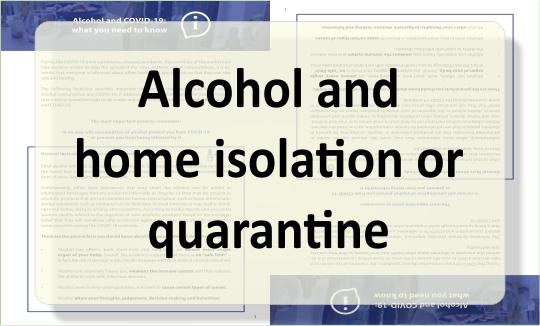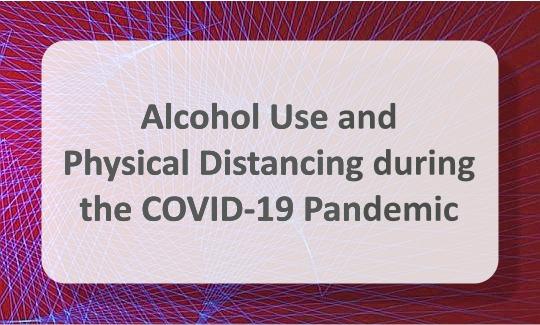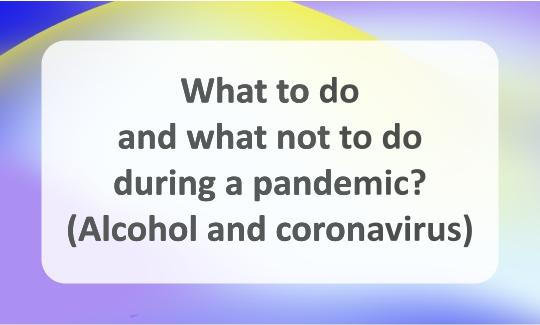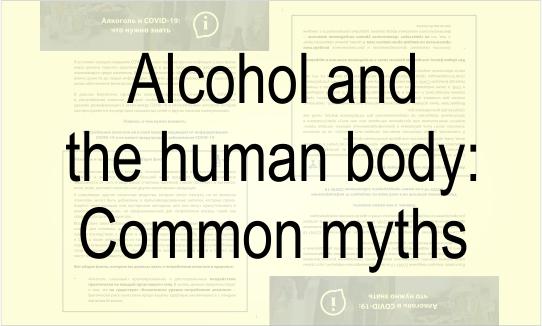Alcohol and home isolation or quarantine

To limit the spread of COVID-19, countries have progressively introduced community-wide lockdowns and periods of quarantine for those who are suspected of having contracted the virus or have been in contact with someone infected by the virus. This means that an unprecedented number of people are now staying in their homes.
It is important to understand that alcohol poses risks to your health and safety and should therefore be avoided during periods of home isolation or quarantine.
- When working from home, adhere to your usual workplace rules and do not drink. Remember that after a lunch break you should still be in a fit state to work – and that is not possible if you are under the influence of alcohol.
- Alcohol is not a necessary part of your diet and should not be a priority on your shopping list. Avoid stockpiling alcohol at home, as this will potentially increase your alcohol consumption and the consumption of others in your household.
- Your time, money and other resources are better invested in buying healthy and nutritious food that will maintain good health and enhance your immune system response. For further ideas, take a look at the food and nutrition tips during self-quarantine issued by WHO.
- You might think that alcohol helps you to cope with stress, but it is not in fact a good coping mechanism, as it is known to increase the symptoms of panic and anxiety disorders, depression and other mental disorders, and the risk of family and domestic violence.
- Instead of consuming alcohol to pass your time at home, try an indoor workout. Physical activity strengthens the immune system and overall – from both a short-term and a long-term perspective – is a highly beneficial way of spending a period of quarantine.
- Do not introduce your children or other young people to drinking and do not get intoxicated in front of them. Child abuse and neglect can be aggravated by alcohol consumption, especially in crowded housing situations where isolation from the drinker is not possible.
- Disinfectant alcohol can easily become accessible for consumption purposes in home isolation. It is important, therefore, to keep such products out of the reach of children and underage drinkers and others who may misuse them.
- Alcohol use can increase during self-isolation and both, isolation and drinking, may also increase the risk of suicide, so reducing your alcohol consumption is very important. If you have suicidal thoughts, you should call your local or national health hotlines
- Alcohol is closely associated with violence, including intimate partner violence. Men perpetrate most of the violence against women, which is worsened by their alcohol consumption, while women experiencing violence are likely to increase their alcohol use as a coping mechanism. If you are a victim of violence and are confined with the perpetrator in home isolation, you need a safety plan in case the situation escalates. This includes having a neighbour, friend, relative or shelter to go to in the event that you need to leave the house immediately. Try to reach out to supportive family members and/or friends and seek support from a hotline or local services for survivors. If you are under quarantine and need to leave the house immediately, call a local support hotline and reach out to someone you trust.
Read more
Alcohol use and physical distancing during the pandemic
Alcohol Use and Physical Distancing during the COVID-19 Pandemic To help slow the spread of the virus, the World Health Organization (WHO) recommends keeping at least three feet away from sick people as a protective measure. Bars, casinos, nightclubs, restaurants, and other places where people gather to consume alcohol, as well as house calls, increase the risk of transmission. Therefore, a protective measure such as physical distancing reduces the availability of alcoholic beverages and gives you a good opportunity to reduce your alcohol consumption and take care of your health. Read more What to do and what not to do during a pandemic? Alcohol: Do's and Don'ts During a COVID-19 Pandemic To avoid weakening your body's immune system, harming your health, and creating health risks for others, you should completely avoid drinking alcoholic beverages. Only in a sober state can you maintain vigilance, speed of reaction and action, and clarity of mind when making…
What to do and what not to do during a pandemic?
Alcohol: Do's and Don'ts During a COVID-19 Pandemic To avoid weakening your body's immune system, harming your health, and creating health risks for others, you should completely avoid drinking alcoholic beverages. Only in a sober state can you maintain vigilance, speed of reaction and action, and clarity of mind when making decisions that affect you personally, your family members, and members of your environment. If you consume alcohol, reduce the amount to a minimum and avoid alcohol intoxication. Drinking alcohol should not become a social occasion for smoking in company and vice versa: drinking alcoholic beverages is often accompanied by smoking, and smoking in turn increases the risk of a more complicated and dangerous course of COVID-19…
Common myths about alcohol and COVID-19 (Alcohol and Coronavirus)
Common myths about alcohol and COVID-19 Myth: Drinking alcohol kills the virus that causes COVID-19. Truth: Drinking alcohol does not kill the virus. Conversely, drinking alcohol can increase health risks if a person becomes infected with the virus. Alcohol (at a concentration of at least 60%) can be effectively used to disinfect the skin, but it does not have a disinfectant effect when ingested. Myth: Drinking strong alcoholic beverages destroys the virus particles in the air you breathe. Truth: Drinking alcohol does not help kill viral particles in the air you breathe…


